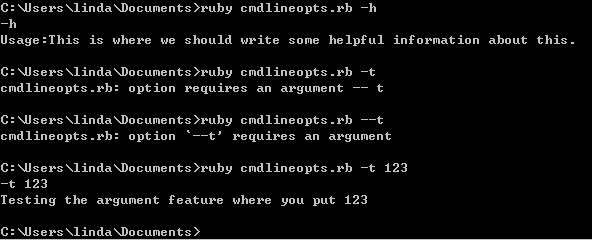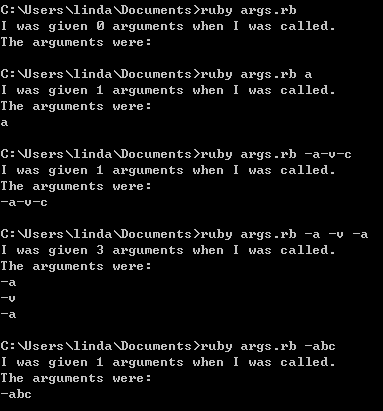 n
=
ARGV.size
n
=
ARGV.size puts
"
I was given #{n} arguments when I was called.
"
puts
"
I was given #{n} arguments when I was called.
"
 puts
"
The arguments were:
"
puts
"
The arguments were:
"
 ARGV.each
do
|arg|
ARGV.each
do
|arg| puts arg
puts arg end
end

1.linux:
 system(
"
echo
"
,
"
hello from the system
"
)
system(
"
echo
"
,
"
hello from the system
"
) puts(
"
hello from ruby
"
)
puts(
"
hello from ruby
"
) exec(
"
pwd
"
)
exec(
"
pwd
"
) puts(
"
hello again from ruby
"
)
puts(
"
hello again from ruby
"
)
2.windows:
 #system(
"
notepad.exe
"
)
#system(
"
notepad.exe
"
) system(
"
cmd /c dir
"
)
system(
"
cmd /c dir
"
)
3.调用shell的六种方法:
转载至http://blackanger.blog.51cto.com/140924/43730
 六种用ruby调用执行shell命令的方法
六种用ruby调用执行shell命令的方法 
 --------------------------------------------------------------------------------
--------------------------------------------------------------------------------

 2007
-
09
-
23
12
:
14
:
41
标签:shell ruby ruby调用shell命令 [推送到博客圈]
2007
-
09
-
23
12
:
14
:
41
标签:shell ruby ruby调用shell命令 [推送到博客圈] 

 版权声明:原创作品,允许转载,转载时请务必以超链接形式标明文章 原始出处 、作者信息和本声明。否则将追究法律责任。http:
//
blackanger.blog.51cto.com/140924/43730
版权声明:原创作品,允许转载,转载时请务必以超链接形式标明文章 原始出处 、作者信息和本声明。否则将追究法律责任。http:
//
blackanger.blog.51cto.com/140924/43730
 碰到需要调用操作系统shell命令的时候,Ruby为我们提供了六种完成任务的方法:
碰到需要调用操作系统shell命令的时候,Ruby为我们提供了六种完成任务的方法: 1
.Exec方法:
1
.Exec方法: Kernel#exec方法通过调用指定的命令取代当前进程:
Kernel#exec方法通过调用指定的命令取代当前进程: 例子:
例子: $ irb
$ irb >>
exec
'
echo "hello $HOSTNAME"
'
>>
exec
'
echo "hello $HOSTNAME"
'
 hello nate.local
hello nate.local $
$ 值得注意的是,exec方法用echo命令来取代了irb进程从而退出了irb。主要的缺点是,你无法从你的ruby脚本里知道这个命令是成功还是失败。
值得注意的是,exec方法用echo命令来取代了irb进程从而退出了irb。主要的缺点是,你无法从你的ruby脚本里知道这个命令是成功还是失败。
 2
.System方法。
2
.System方法。 Kernel#system方法操作命令同上, 但是它是运行一个子shell来避免覆盖当前进程。如果命令执行成功则返回true,否则返回false。
Kernel#system方法操作命令同上, 但是它是运行一个子shell来避免覆盖当前进程。如果命令执行成功则返回true,否则返回false。
 $ irb
$ irb  >>
system
'
echo "hello $HOSTNAME"
'
>>
system
'
echo "hello $HOSTNAME"
'
 hello nate.local
hello nate.local =>
true
=>
true
 >>
system
'
false
'
>>
system
'
false
'
 =>
false
=>
false
 >>
puts $
?
>>
puts $
?
 256
256
 =>
nil
=>
nil >>
>>
 3
.反引号(Backticks,Esc键下面那个键)
3
.反引号(Backticks,Esc键下面那个键) $ irb
$ irb >>
today
=
`date`
>>
today
=
`date` =>
"
Mon Mar 12 18:15:35 PDT 2007n
"
=>
"
Mon Mar 12 18:15:35 PDT 2007n
"
 >>
$
?
>>
$
?
 =>
#
<
Process::Status: pid
=
25827
,exited(
0
)
>
=>
#
<
Process::Status: pid
=
25827
,exited(
0
)
>
 >>
$
?
.to_i
>>
$
?
.to_i =>
0
=>
0
 这种方法是最普遍的用法了。它也是运行在一个子shell中。
这种方法是最普遍的用法了。它也是运行在一个子shell中。 4
.IO#popen
4
.IO#popen $ irb
$ irb
 >>
IO.popen(
"
date
"
)
...
{ |f| puts f.gets }
>>
IO.popen(
"
date
"
)
...
{ |f| puts f.gets }
 Mon Mar
12
18
:
58
:
56
PDT
2007
Mon Mar
12
18
:
58
:
56
PDT
2007
 =>
nil
=>
nil 5
.open3#popen3
5
.open3#popen3 $ irb
$ irb >>
stdin, stdout, stderr
=
Open3.popen3(
'
dc
'
)
>>
stdin, stdout, stderr
=
Open3.popen3(
'
dc
'
)  =>
[#
<
IO:
0x6e5474
>
, #
<
IO:
0x6e5438
>
, #
<
IO:
0x6e53d4
>
]
=>
[#
<
IO:
0x6e5474
>
, #
<
IO:
0x6e5438
>
, #
<
IO:
0x6e53d4
>
] >>
stdin.puts(
5
)
>>
stdin.puts(
5
) =>
nil
=>
nil >>
stdin.puts(
10
)
>>
stdin.puts(
10
) =>
nil
=>
nil >>
stdin.puts(
"
+
"
)
>>
stdin.puts(
"
+
"
) =>
nil
=>
nil >>
stdin.puts(
"
p
"
)
>>
stdin.puts(
"
p
"
) =>
nil
=>
nil >>
stdout.gets
>>
stdout.gets =>
"
15n
"
=>
"
15n
"
 6
.Open4#popen4
6
.Open4#popen4 $ irb
$ irb >>
require
"
open4
"
>>
require
"
open4
"
 =>
true
=>
true
 >>
pid, stdin, stdout, stderr
=
Open4::popen4
"
false
"
>>
pid, stdin, stdout, stderr
=
Open4::popen4
"
false
"
 =>
[
26327
, #
<
IO:
0x6dff24
>
, #
<
IO:
0x6dfee8
>
, #
<
IO:
0x6dfe84
>
]
=>
[
26327
, #
<
IO:
0x6dff24
>
, #
<
IO:
0x6dfee8
>
, #
<
IO:
0x6dfe84
>
] >>
$
?
>>
$
?
 =>
nil
=>
nil >>
pid
>>
pid =>
26327
=>
26327
 >>
ignored, status
=
Process::waitpid2 pid
>>
ignored, status
=
Process::waitpid2 pid =>
[
26327
, #
<
Process::Status: pid
=
26327
,exited(
1
)
>
]
=>
[
26327
, #
<
Process::Status: pid
=
26327
,exited(
1
)
>
] >>
status.to_i
>>
status.to_i =>
256
=>
256





 本文出自 “引路人” 博客,请务必保留此出处http:
//
blackanger.blog.51cto.com/140924/43730
本文出自 “引路人” 博客,请务必保留此出处http:
//
blackanger.blog.51cto.com/140924/43730

 本文出自 51CTO.COM技术博客
本文出自 51CTO.COM技术博客 


4.cmdline options
 require
'
getoptlong'
require
'
getoptlong'

 parser
=
GetoptLong.new
parser
=
GetoptLong.new
 parser.set_options([
"
-h
"
,
"
--help
"
,GetoptLong::NO_ARGUMENT],
parser.set_options([
"
-h
"
,
"
--help
"
,GetoptLong::NO_ARGUMENT], [
"
-t
"
,
"
--test
"
,GetoptLong::REQUIRED_ARGUMENT])
[
"
-t
"
,
"
--test
"
,GetoptLong::REQUIRED_ARGUMENT])
 loop
do
loop
do
 begin
begin opt,arg
=
parser.get
opt,arg
=
parser.get break
if
not
opt
break
if
not
opt puts(
"
#{opt} #{arg}
"
)
puts(
"
#{opt} #{arg}
"
)
 case
opt
case
opt when
"
-h
"
when
"
-h
"
 puts
"
Usage:This is where we should write some helpful information about this.
"
puts
"
Usage:This is where we should write some helpful information about this.
"
 break
break when
"
-t
"
when
"
-t
"
 puts
"
Testing the argument feature where you put #{arg}
"
puts
"
Testing the argument feature where you put #{arg}
"
 end
end

 rescue
=>
err
rescue
=>
err break
break end
end
 end
end



 -------------------------------------------------------------
Class :
Class: GetoptLong
-------------------------------------------------------------
Class :
Class: GetoptLong
 The GetoptLong Class allowsclass allows you to parse command line options similarly to the GNU getopt_long() C library call. Note, however, that GetoptLong is a pure Ruby implementation.
The GetoptLong Class allowsclass allows you to parse command line options similarly to the GNU getopt_long() C library call. Note, however, that GetoptLong is a pure Ruby implementation.
 GetoptLong allows for POSIX-style options like --file as well as single letter options like -f
GetoptLong allows for POSIX-style options like --file as well as single letter options like -f
 The empty option -- (two minus symbols) is used to end option processing. This can be particularly important if options have optional arguments.
The empty option -- (two minus symbols) is used to end option processing. This can be particularly important if options have optional arguments.
 Here is a simple example of usage:
Here is a simple example of usage:
 # == Synopsis
# == Synopsis #
# # hello: greets user, demonstrates command line parsing
# hello: greets user, demonstrates command line parsing #
# # == Usage
# == Usage #
# # hello [OPTION] ... DIR
# hello [OPTION] ... DIR #
# # -h, --help:
# -h, --help: # show help
# show help #
# # --repeat x, -n x:
# --repeat x, -n x: # repeat x times
# repeat x times #
# # --name [name]:
# --name [name]: # greet user by name, if name not supplied default is John
# greet user by name, if name not supplied default is John #
# # DIR: The directory in which to issue the greeting.
# DIR: The directory in which to issue the greeting.
 require 'getoptlong'
require 'getoptlong' require 'rdoc/usage'
require 'rdoc/usage'
 opts = GetoptLong.new(
opts = GetoptLong.new( [ '--help', '-h', GetoptLong::NO_ARGUMENT ],
[ '--help', '-h', GetoptLong::NO_ARGUMENT ], [ '--repeat', '-n', GetoptLong::REQUIRED_ARGUMENT ],
[ '--repeat', '-n', GetoptLong::REQUIRED_ARGUMENT ], [ '--name', GetoptLong::OPTIONAL_ARGUMENT ]
[ '--name', GetoptLong::OPTIONAL_ARGUMENT ] )
)
 dir = nil
dir = nil name = nil
name = nil repetitions = 1
repetitions = 1 opts.each do |opt, arg|
opts.each do |opt, arg| case opt
case opt when '--help'
when '--help' RDoc::usage
RDoc::usage when '--repeat'
when '--repeat' repetitions = arg.to_i
repetitions = arg.to_i when '--name'
when '--name' if arg == ''
if arg == '' name = 'John'
name = 'John' else
else name = arg
name = arg end
end end
end end
end
 if ARGV.length != 1
if ARGV.length != 1 puts "Missing dir argument (try --help)"
puts "Missing dir argument (try --help)" exit 0
exit 0 end
end
 dir = ARGV.shift
dir = ARGV.shift
 Dir.chdir(dir)
Dir.chdir(dir) for i in (1..repetitions)
for i in (1..repetitions) print "Hello"
print "Hello" if name
if name print ", #{name}"
print ", #{name}" end
end puts
puts end
end
 Example command line:
Example command line:
 hello -n 6 --name -- /tmp
hello -n 6 --name -- /tmp
 -------------------------------------------------------------------------------
-------------------------------------------------------------------------------
 Constants:
Constants: ORDERINGS: [REQUIRE_ORDER = 0, PERMUTE = 1, RETURN_IN_ORDER = 2]
ORDERINGS: [REQUIRE_ORDER = 0, PERMUTE = 1, RETURN_IN_ORDER = 2] ARGUMENT_FLAGS: [NO_ARGUMENT = 0, REQUIRED_ARGUMENT = 1, OPTIONAL_ARGUMENT = 2]
ARGUMENT_FLAGS: [NO_ARGUMENT = 0, REQUIRED_ARGUMENT = 1, OPTIONAL_ARGUMENT = 2] STATUS_TERMINATED: 0, 1, 2
STATUS_TERMINATED: 0, 1, 2

 Class methodsClass methods:
Class methodsClass methods: new
new
 Instance methods:
Instance methods: each, each_option, error_message, get, get_option, ordering=, set_error, set_options, terminate, terminated?
each, each_option, error_message, get, get_option, ordering=, set_error, set_options, terminate, terminated?
 Attributes:
Attributes: error, ordering, quiet, quiet
error, ordering, quiet, quiet
5.cmdline arguments
 n
=
ARGV.size
n
=
ARGV.size puts
"
I was given #{n} arguments when I was called.
"
puts
"
I was given #{n} arguments when I was called.
"
 puts
"
The arguments were:
"
puts
"
The arguments were:
"
 ARGV.each
do
|arg|
ARGV.each
do
|arg| puts arg
puts arg end
end


6.use ruby to gain environmental variables:






















 382
382

 被折叠的 条评论
为什么被折叠?
被折叠的 条评论
为什么被折叠?








